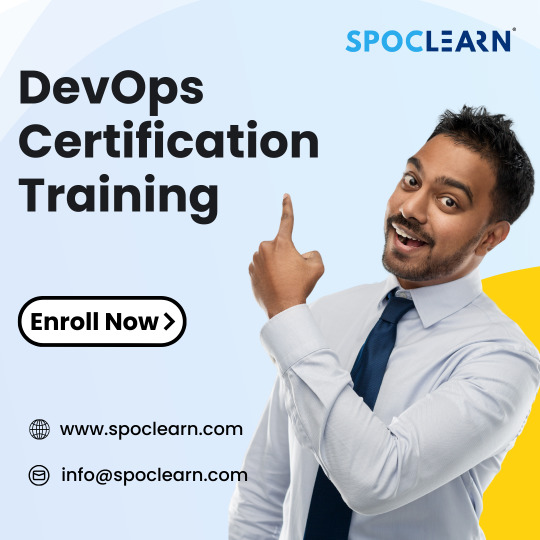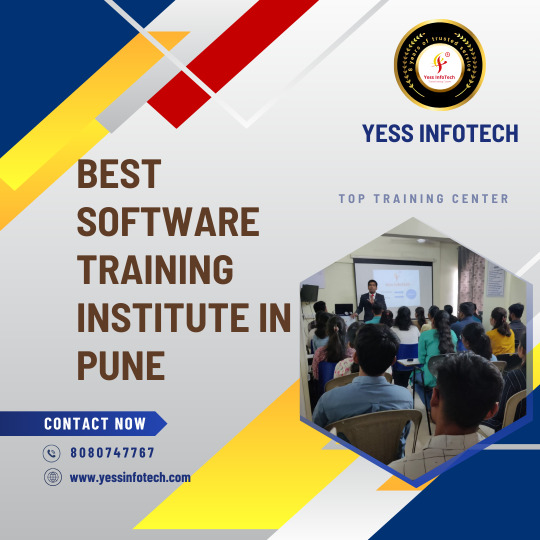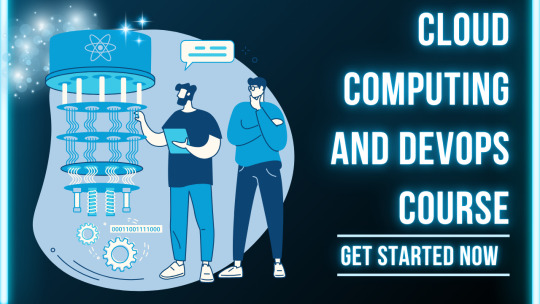#Cloud computing and DevOps training
Explore tagged Tumblr posts
Text
Elevate your skills with CodinixCloud's Terraform Course and certification training. Master Terraform, the industry-leading infrastructure as code tool, and boost your career in cloud computing and DevOps.
0 notes
Text
Best DevOps Engineering Training and Cloud Computing Certification for Career Growth
Take your career to new heights with top-tier DevOps training programs and the best cloud computing certification. Our DevOps training provider offers over 100 hands-on projects and real-world scenarios, giving you an immersive learning experience in the DevOps cycle. Perfect for those aiming to become DevOps engineers or seeking to expand their expertise in Cloud computing, our courses are designed to equip you with the skills and knowledge needed to succeed. Whether you want to dive into DevOps tools or learn industry-standard processes, our training programs prepare you for success.
2 notes
·
View notes
Text

🚀 Ready to Master DevOps? 🚀
The wait is over! Our New DevOps Online Training starts On Nov 9, 2024, at eMexo Technologies! 📅💻 Learn how to streamline development, automate processes, and take your IT skills to the next level! 🔧✨
💡 Don’t miss this chance to join the future of IT! Our hands-on training will equip you with the skills to thrive in a DevOps environment! 🏆
👉 CLICK THE LINK https://www.emexotechnologies.com/courses/devops-certification-training-course/
🎯 Why Choose Us?
Expert Instructors with Industry Experience
Flexible Learning Schedules
Real-time Support & Guidance
Placement Assistance
Hurry, limited seats are available! 🎟️
Call / Whatsapp us:
📞 +91 9513216462
#devops tools#devops#cloud computing training#ittraining#techeducation#emexotechnologies#bangalore#electroniccity#traininginstitute#education#learning#course#training#careers#tech skills
2 notes
·
View notes
Text
This Software Training Institute in Bangalore is Secretly Powering India's Top Tech Careers – Discover How
In the buzzing tech capital of India, one Software Training Institute in Bangalore is quietly making waves—and transforming ordinary learners into extraordinary IT professionals. Welcome to Kodestree, where innovation meets education, and students don’t just learn—they thrive.

Whether you’re fresh out of college or a working professional seeking career growth, Kodestree’s software training programs are tailored to match industry demands. From full-stack development, data science, and DevOps to cloud technologies like Azure and AWS, this institute blends practical training with real-world projects—equipping learners with job-ready skills.
Why Kodestree is the Go-To Software Training Institute in Bangalore:
✅ 100% Placement Support with tie-ups across leading MNCs
💻 Hands-On Live Projects from real-time industry use cases
🎓 Classroom & Online Training Options for flexible learning
📜 Industry-recognized Certifications to boost your résumé
🧑🏫 Mentorship by IT Veterans with 10+ years of field experience
📈 Custom paths for career switchers and upskillers
The institute also stands out for its interactive classrooms, up-to-date curriculum, and a thriving community of tech enthusiasts. Unlike outdated training centers, Kodestree is future-forward—teaching tools and tech stacks that top companies are hiring for right now.
So, if you're hunting for the best software courses in Bangalore, Kodestree might just be your golden ticket.
📍 Location Highlight:
Kodestree is conveniently located at Sunrise Heights #5, Street No:15, Green Garden Layout, Sai Baba Temple Road, Kundalhalli Gate, Bengaluru - 560037.
📞 Contact: +91-7015941166 🌐 Website: https://kodestree.com
#Software Training Institute in Bangalore#Best Software Courses in Bangalore#IT Training Institute in Bangalore#Software Development Course Bangalore#Coding Classes in Bangalore#Software Training with Placement in Bangalore#Top IT Courses in Bangalore#Full Stack Developer Course Bangalore#Data Science Course in Bangalore#Python Training Institute in Bangalore#Java Training Institute in Bangalore#DevOps Course in Bangalore#Cloud Computing Training Bangalore#Job Oriented Software Courses Bangalore.
1 note
·
View note
Text
DevOps & Cloud: A Perfect Tech Partnership
Cloud and DevOps go hand in hand—learn how their integration accelerates development, improves deployment, and enhances scalability.
0 notes
Text
Best Software Training Institute in Pune | Yess Infotech
#Best software training institute in Pune#software training Pune#IT training Pune#full stack development training Pune#data science training Pune#cloud computing training Pune#cybersecurity training Pune#DevOps training Pune#software courses Pune#Yess Infotech Pune#IT career Pune.
0 notes
Text
Get Professional IT Courses & Training Programs | MNP Technologies
Looking for quality IT training? MNP Technologies offers comprehensive courses in Cloud Computing, Data Warehousing, Java, Oracle, and SAP. Join us to gain hands-on experience, expert insights, and career-boosting certifications. Enroll now!
#software trainig institute#SAP training#DevOps Training#Cloud Computing Training#IT Training Courses
0 notes
Text
Breaking into the Cloud Computing and DevOps Field: Where to Start?

The tech landscape is rapidly transforming, with cloud computing and DevOps at the forefront of this evolution. As businesses increasingly migrate their operations to the cloud and adopt agile practices, the demand for skilled professionals in these areas continues to rise. If you’re looking to break into this exciting field, one of the best first steps is to enroll in a cloud computing institute in Hyderabad. Here’s how to get started on your journey.
Understanding the Basics
Before diving into a career in cloud computing and DevOps, it’s essential to understand what these fields entail. Cloud computing involves delivering various services, such as storage, databases, and software, over the internet, enabling businesses to operate more efficiently. DevOps is a set of practices that integrates software development (Dev) and IT operations (Ops), fostering collaboration and streamlining workflows.
Understanding these concepts in cloud computing institute in Hyderabad lays the foundation for your career. Once you grasp the basics, you can focus on acquiring the necessary skills and knowledge.
Choosing the Right Cloud Computing Institute in Hyderabad
Selecting a reputable cloud computing institute in Hyderabad is crucial for your education and future career. Look for institutes that offer:
Comprehensive Curriculum: Ensure the program covers essential topics such as cloud service models (IaaS, PaaS, SaaS), deployment models, cloud security, and fundamental DevOps practices.
Hands-On Training: Practical experience is vital. Choose institutes that offer labs, projects, and internships to apply theoretical knowledge in real-world scenarios.
Industry Recognition: Look for programs that are well-regarded in the industry, ideally with partnerships or collaborations with leading tech companies.
Experienced Instructors: Learn from professionals with real-world experience who can provide valuable insights and mentorship.
Certifications: Opt for institutes that prepare you for industry-recognized certifications, such as AWS Certified Solutions Architect or Microsoft Certified: Azure Fundamentals. These credentials enhance your employability and credibility.
Building Your Skill Set
Once you’ve enrolled in a cloud computing institute in Hyderabad, focus on building your skill set. Key areas to concentrate on include:
Cloud Platforms: Familiarize yourself with major cloud service providers like AWS, Microsoft Azure, and Google Cloud. Understanding their services and offerings will give you a competitive edge.
Networking and Security: Learn about network configurations, security protocols, and compliance standards relevant to cloud environments.
DevOps Tools: Gain proficiency in popular DevOps tools such as Docker, Kubernetes, Jenkins, and Git. These tools are essential for automating processes and enhancing collaboration.
Scripting and Automation: Basic programming and scripting skills (Python, Bash, etc.) can significantly enhance your ability to automate tasks and manage cloud resources efficiently.
Gaining Practical Experience
Practical experience is crucial for solidifying your understanding and enhancing your resume. Participate in internships or collaborative projects during your training. Many cloud computing institutes in Hyderabad offer internship placements that can provide invaluable experience.
Additionally, consider contributing to open-source projects or creating your own projects. This hands-on experience not only helps you apply your skills but also demonstrates your initiative and problem-solving capabilities to potential employers.
Networking and Building Connections
Networking is essential in the tech industry. Attend workshops, webinars, and local meetups to connect with professionals and peers. Joining online forums and social media groups focused on cloud computing and DevOps can also help you stay updated on industry trends and job opportunities.
Leverage platforms like LinkedIn to showcase your skills, share your projects, and engage with industry leaders. Building a strong professional network can lead to mentorship opportunities and job referrals.
Exploring Career Opportunities
Once you’ve completed your training from cloud computing institute in Hyderabad and gained practical experience, it’s time to explore career opportunities. The job market for cloud computing and DevOps professionals is robust, with various roles available, including:
Cloud Engineer: Responsible for managing and implementing cloud services and solutions.
DevOps Engineer: Focuses on integrating development and operations to improve deployment efficiency and reliability.
Cloud Architect: Designs and oversees cloud infrastructure and strategy.
Site Reliability Engineer (SRE): Ensures systems' reliability and performance through proactive monitoring and incident management.
Many organizations are actively seeking talent in these roles, offering competitive salaries and benefits.
Continuous Learning and Development
The tech landscape is ever-evolving, making continuous learning vital. After starting your career, consider pursuing additional certifications or advanced training programs to keep your skills updated. This commitment to learning will enhance your career trajectory and keep you relevant in a competitive job market.
Conclusion
Breaking into the cloud computing and DevOps field may seem daunting, but with the right approach, it can be an exciting and rewarding journey. Start by enrolling in a reputable cloud computing institute in Hyderabad to gain the foundational knowledge and skills necessary for success. Focus on building your expertise, gaining practical experience, and networking within the industry. By taking these steps, you’ll be well on your way to establishing a fulfilling career in these dynamic and in-demand fields. Embrace the challenge, and you’ll find a world of opportunities waiting for you!
#technology#ai#devops#aws#Cloud Computing#cloud computing course in mumbai#cloud computing trends#cloud computing certification#cloud computing market#cloud computing training#cloud computing jobs#cloud computing course#DevOps#aws devops course in hyderabad#devops certification#DevOps training#DevOps course#DevOps training in hyderabad#aws training in hyderabad#aws cloud#aws certification#aws course
0 notes
Text

🚀 Join Us TODAY for an Exclusive Azure DevOps Demo! 🚀
💡 Ready to boost your DevOps skills? Learn about Azure DevOps in our hands-on online demo TODAY at eMexo Technologies! 🎓🔥 PLUS, we're offering an incredible 40% OFF for a limited time! 💥
📅 Don't Miss Out – The clock is ticking! ⏳ Gain real-world insights and start your journey to becoming a DevOps pro! 🛠️
👉 CLICK THE LINK https://www.emexotechnologies.com/courses/microsoft-azure-devops-training-course-az-400/ to secure your spot NOW! 💻✨
📅 25th Sept 2024 🧭 9 PM ( IST )
Format: Online Training
Contact Us For More Info:
📞 Phone: +91 9513216462
🌐 Website: https://www.emexotechnologies.com/
#azure devops#azure training#devops#cloud computing training#emexotechnologies#bangalore#electroniccity#traininginstitute#e learning#online courses#online training#tech education#tech skills#software training institute
2 notes
·
View notes
Text
Master DevOps: Your Complete Guide and Roadmap | DevOps Online Training

Introduction to DevOps
In today's rapidly evolving technological landscape, the need for streamlined and efficient software development practices has never been greater. Enter DevOps—a culture, philosophy, and set of practices that bring development (Dev) and operations (Ops) together to improve collaboration, integration, and automation throughout the software development lifecycle. DevOps is not just a buzzword; it's a transformative approach that enables organizations to deliver high-quality software faster and more reliably. If you're looking to build a career in this field, DevOps Online Training is your gateway to mastering the skills required to excel in this domain.
What is DevOps?
DevOps is a combination of practices, tools, and cultural philosophies designed to increase an organization's ability to deliver applications and services at high velocity. By breaking down the traditional silos between development and operations teams, DevOps fosters a culture of collaboration, where both teams work together throughout the entire software development lifecycle. This collaboration leads to faster development, more frequent deployment of updates, and higher overall software quality.
At its core, DevOps emphasizes automation, continuous integration, continuous delivery (CI/CD), and monitoring. The goal is to minimize manual intervention, reduce errors, and improve the efficiency of software development and deployment. Through DevOps Online Training, you can learn how to implement these practices in real-world scenarios, making you an invaluable asset to any tech organization.
How DevOps Works
DevOps is built on a set of principles and practices that enable organizations to build, test, and deploy software rapidly and efficiently. Here's how DevOps works in practice:
1. Continuous Integration and Continuous Deployment (CI/CD)
Continuous Integration (CI) is the practice of merging code changes frequently, often multiple times a day, into a shared repository. Automated testing is then conducted to identify and resolve issues early in the development process. Continuous Deployment (CD) takes this a step further by automatically deploying code changes to production after passing the CI pipeline. Together, CI/CD reduces the time between writing code and delivering it to customers, ensuring that software updates are released frequently and reliably.
2. Automation
Automation is a critical component of DevOps. From building and testing code to deploying and monitoring applications, automation helps streamline the entire software development lifecycle. By automating repetitive tasks, teams can focus on more strategic activities, such as optimizing code and improving system performance. Automation tools like Jenkins, Ansible, and Puppet are commonly used in DevOps to create efficient, repeatable processes.
3. Infrastructure as Code (IaC)
Infrastructure as Code (IaC) is the practice of managing and provisioning computing infrastructure through machine-readable scripts rather than manual processes. This approach allows teams to automate the setup and configuration of environments, ensuring consistency across development, testing, and production stages. Tools like Terraform and AWS CloudFormation are popular choices for implementing IaC.
4. Monitoring and Logging
Effective monitoring and logging are essential to maintaining the health and performance of applications in a DevOps environment. By continuously monitoring systems and capturing logs, teams can identify and resolve issues before they impact end-users. Tools like Prometheus, Grafana, and ELK Stack are widely used for monitoring and logging in DevOps.
5. Collaboration and Communication
DevOps is as much about culture as it is about technology. A key aspect of DevOps is fostering a culture of collaboration and communication between development, operations, and other stakeholders. This collaboration ensures that everyone is aligned with the project's goals and that issues are addressed quickly. Tools like Slack, Microsoft Teams, and Jira facilitate communication and collaboration in a DevOps environment.
6. Security in DevOps (DevSecOps)
As security becomes increasingly important in software development, DevOps practices have evolved to include security as a core component. DevSecOps integrates security into every stage of the software development lifecycle, ensuring that security vulnerabilities are identified and addressed early in the process. By adopting DevSecOps practices, organizations can build more secure applications without compromising on speed and agility.
The Roadmap to Becoming a DevOps Engineer
Becoming a DevOps engineer requires a combination of technical skills, practical experience, and a deep understanding of DevOps principles. Here's a step-by-step roadmap to guide you on your journey:
1. Understand the Basics of DevOps
Before diving into specific tools and technologies, it's important to understand the fundamental principles of DevOps. Learn about the core concepts of CI/CD, automation, IaC, and monitoring. DevOps Online Training can provide you with a solid foundation in these areas, helping you grasp the essential elements of DevOps.
2. Gain Proficiency in Programming and Scripting
A strong foundation in programming and scripting is essential for a DevOps engineer. Start by learning a programming language like Python, Ruby, or Go, as well as scripting languages like Bash or PowerShell. These skills will enable you to automate tasks, write custom scripts, and work with various DevOps tools.
3. Master Version Control Systems
Version control systems (VCS) like Git are critical to DevOps practices. Learn how to use Git for version control, branching, and merging code. Understand how to collaborate with other developers using GitHub, GitLab, or Bitbucket. Version control is a fundamental skill that every DevOps engineer must possess.
4. Get Hands-On with CI/CD Tools
CI/CD is at the heart of DevOps, so gaining hands-on experience with CI/CD tools is crucial. Learn how to set up and configure Jenkins, CircleCI, or Travis CI to automate the build, test, and deployment processes. DevOps Online Training often includes practical labs and exercises that allow you to practice using these tools in real-world scenarios.
5. Learn About Infrastructure as Code (IaC)
IaC is a key practice in DevOps, enabling teams to manage and provision infrastructure programmatically. Familiarize yourself with IaC tools like Terraform, AWS CloudFormation, and Ansible. Learn how to write scripts that automate the creation and configuration of infrastructure, ensuring consistency across environments.
6. Develop Cloud Computing Skills
Cloud computing is an integral part of DevOps, as it provides the scalability and flexibility needed for modern software development. Gain proficiency in cloud platforms like AWS, Azure, or Google Cloud. Learn how to deploy applications to the cloud, manage cloud resources, and work with cloud-based DevOps tools.
7. Enhance Your Automation Skills
Automation is a cornerstone of DevOps, so it's essential to master automation tools and techniques. Learn how to automate tasks using tools like Jenkins, Puppet, and Chef. Understand how to create automated workflows that integrate with other DevOps tools and processes.
8. Learn About Monitoring and Logging
Effective monitoring and logging are crucial for maintaining the health of applications in a DevOps environment. Familiarize yourself with monitoring tools like Prometheus and Grafana, as well as logging tools like the ELK Stack. Learn how to set up monitoring dashboards, create alerts, and analyze logs to identify and resolve issues.
9. Embrace DevSecOps Practices
Security is a critical aspect of DevOps, and understanding DevSecOps practices is essential for a successful career in this field. Learn how to integrate security into the CI/CD pipeline, conduct security testing, and implement security best practices throughout the software development lifecycle.
10. Gain Practical Experience
Theory alone is not enough to become a proficient DevOps engineer. Hands-on experience is crucial. Work on real-world projects, contribute to open-source DevOps projects, or participate in internships. Practical experience will help you apply the skills you've learned and build a portfolio that showcases your expertise.
11. Obtain DevOps Certifications
Certifications can validate your skills and make you stand out in the job market. Consider obtaining certifications like AWS Certified DevOps Engineer, Google Cloud DevOps Engineer, or Microsoft Certified: Azure DevOps Engineer Expert. These certifications demonstrate your proficiency in DevOps practices and tools.
12. Stay Updated with Industry Trends
The field of DevOps is constantly evolving, with new tools and practices emerging regularly. Stay updated with industry trends by reading blogs, attending conferences, and participating in online communities. DevOps Online Training programs often include updates on the latest trends and tools in the industry.
13. Build a Strong Professional Network
Networking is important in any career, and DevOps is no exception. Join DevOps communities, attend meetups, and connect with other professionals in the field. Building a strong network can lead to job opportunities, collaborations, and valuable insights.
14. Prepare for DevOps Interviews
As you near the end of your learning journey, it's time to prepare for DevOps interviews. Practice common DevOps interview questions, participate in mock interviews, and review your projects and experiences. DevOps Online Training programs often include interview preparation sessions to help you succeed in landing your first DevOps job.
Conclusion
DevOps is a powerful approach that has revolutionized the way software is developed, tested, and deployed. By fostering collaboration between development and operations teams and leveraging automation, CI/CD, and cloud computing, DevOps enables organizations to deliver high-quality software at a rapid pace. Whether you're just starting your career or looking to transition into the field, DevOps Online Training can provide you with the skills and knowledge needed to succeed as a DevOps engineer.
By following the roadmap outlined in this article, you can develop the technical expertise, practical experience, and industry knowledge required to excel in DevOps. Remember to stay updated with the latest trends, build a strong network, and continuously improve your skills.
#devops#devopsonlinetraining#devops engineer#DevOps Roadmap#web development#development#software#Continuous Integration#Continuous Deployment#Cloud Computing#Automation#Software Development#IT Training#cicd#it training institute#it training courses#it training classes
0 notes
Text

Enhance your IT skills with Spoclearn's DevOps Foundation Certification Training in United States. This comprehensive program covers essential DevOps principles, including continuous integration, delivery, and automation. Led by industry experts, our training offers hands-on labs, real-world case studies, and flexible learning options, including virtual classrooms and self-paced modules. Gain the knowledge and certification to streamline workflows, improve collaboration, and boost your career in the fast-growing field of DevOps. Join Spoclearn and take the first step towards becoming a proficient DevOps professional. Enroll today!
Spoclearn is a global training provider and corporate certification training company, offering a wide range of over 100 certification and non-certification courses across various domains including ITSM, Project Management, Agile and Scrum, DevOps, Quality Management, Cybersecurity, Digital Marketing, Microsoft Office, Data Science, AWS, and Development & Testing. We are dedicated to transforming human talent and fostering a learning culture that meets complex market demands. Our vision is to be the Single Point of Contact for Learning needs worldwide, aiming to equip individuals and enterprises with the knowledge and skills needed to thrive in a dynamic business landscape.
For More Information
Call Us • USA : +1 (908) 2937144 • India : +91 83417-05065 • UK : +44 1313813655
Email Us • [email protected]
Addresses • United States - 3500 South DuPont Highway Suite DK 101, Dover, DE 19901, United States • India - No.8/2, Novel Office Centre, Halasuru Rd, Bengaluru, 560042, KA, INDIA
0 notes
Text
Dynamics 365 Finance and Operations training programs
Explore comprehensive Dynamics 365 Finance and Operations training programs with Varnanz in Bangalore, India. Specializing in trade and distribution, our expert-led courses are designed to enhance your skills and knowledge in managing financials, supply chain, and operations efficiently.
Join us to advance your career with hands-on training and industry-recognized certifications.
0 notes
Text

#Best software training institute in Pune#software training Pune#IT training Pune#full stack development training Pune#data science training Pune#cloud computing training Pune#cybersecurity training Pune#DevOps training Pune#software courses Pune#Yess Infotech Pune#IT career Pune.
0 notes
Text
Is DevOps All About Coding? Exploring the Role of Programming and Essential Skills in DevOps

As technology continues to advance, DevOps has emerged as a key practice for modern software development and IT operations. A frequently asked question among those exploring this field is: "Is DevOps full of coding?" The answer isn’t black and white. While coding is undoubtedly an important part of DevOps, it’s only one piece of a much larger puzzle.
This article unpacks the role coding plays in DevOps, highlights the essential skills needed to succeed, and explains how DevOps professionals contribute to smoother software delivery. Additionally, we’ll introduce the Boston Institute of Analytics’ Best DevOps Training program, which equips learners with the knowledge and tools to excel in this dynamic field.
What Exactly is DevOps?
DevOps is a cultural and technical approach that bridges the gap between development (Dev) and operations (Ops) teams. Its main goal is to streamline the software delivery process by fostering collaboration, automating workflows, and enabling continuous integration and delivery (CI/CD). DevOps professionals focus on:
Enhancing communication between teams.
Automating repetitive tasks to improve efficiency.
Ensuring systems are scalable, secure, and reliable.
The Role of Coding in DevOps
1. Coding is Important, But Not Everything
While coding is a key component of DevOps, it’s not the sole focus. Here are some areas where coding is essential:
Automation: Writing scripts to automate processes like deployments, testing, and monitoring.
Infrastructure as Code (IaC): Using tools such as Terraform or AWS CloudFormation to manage infrastructure programmatically.
Custom Tool Development: Building tailored tools to address specific organizational needs.
2. Scripting Takes Center Stage
In DevOps, scripting often takes precedence over traditional software development. Popular scripting languages include:
Python: Ideal for automation, orchestration, and data processing tasks.
Bash: Widely used for shell scripting in Linux environments.
PowerShell: Commonly utilized for automating tasks in Windows ecosystems.
3. Mastering DevOps Tools
DevOps professionals frequently work with tools that minimize the need for extensive coding. These include:
CI/CD Platforms: Jenkins, GitLab CI/CD, and CircleCI.
Configuration Management Tools: Ansible, Chef, and Puppet.
Monitoring Tools: Grafana, Prometheus, and Nagios.
4. Collaboration is Key
DevOps isn’t just about writing code—it’s about fostering teamwork. DevOps engineers serve as a bridge between development and operations, ensuring workflows are efficient and aligned with business objectives. This requires strong communication and problem-solving skills in addition to technical expertise.
Skills You Need Beyond Coding
DevOps demands a wide range of skills that extend beyond programming. Key areas include:
1. System Administration
Understanding operating systems, networking, and server management is crucial. Proficiency in both Linux and Windows environments is a major asset.
2. Cloud Computing
As cloud platforms like AWS, Azure, and Google Cloud dominate the tech landscape, knowledge of cloud infrastructure is essential. This includes:
Managing virtual machines and containers.
Using cloud-native tools like Kubernetes and Docker.
Designing scalable and secure cloud solutions.
3. Automation and Orchestration
Automation lies at the heart of DevOps. Skills include:
Writing scripts to automate deployments and system configurations.
Utilizing orchestration tools to manage complex workflows efficiently.
4. Monitoring and Incident Response
Ensuring system reliability is a critical aspect of DevOps. This involves:
Setting up monitoring dashboards for real-time insights.
Responding to incidents swiftly to minimize downtime.
Analyzing logs and metrics to identify and resolve root causes.
Is DevOps Right for You?
DevOps is a versatile field that welcomes professionals from various backgrounds, including:
Developers: Looking to expand their skill set into operations and automation.
System Administrators: Interested in learning coding and modern practices like IaC.
IT Professionals: Seeking to enhance their expertise in cloud computing and automation.
Even if you don’t have extensive coding experience, there are pathways into DevOps. With the right training and a willingness to learn, you can build a rewarding career in this field.
Boston Institute of Analytics: Your Path to DevOps Excellence
The Boston Institute of Analytics (BIA) offers a comprehensive DevOps training program designed to help professionals at all levels succeed. Their curriculum covers everything from foundational concepts to advanced techniques, making it one of the best DevOps training programs available.
What Sets BIA’s DevOps Training Apart?
Hands-On Experience:
Work with industry-standard tools like Docker, Kubernetes, Jenkins, and AWS.
Gain practical knowledge through real-world projects.
Expert Instructors:
Learn from seasoned professionals with extensive industry experience.
Comprehensive Curriculum:
Dive deep into topics like CI/CD, IaC, cloud computing, and monitoring.
Develop both technical and soft skills essential for DevOps roles.
Career Support:
Benefit from personalized resume reviews, interview preparation, and job placement assistance.
By enrolling in BIA’s Best DevOps Training, you’ll gain the skills and confidence to excel in this ever-evolving field.
Final Thoughts
So, is DevOps full of coding? While coding plays an important role in DevOps, it’s far from the whole picture. DevOps is about collaboration, automation, and ensuring reliable software delivery. Coding is just one of the many skills you’ll need to succeed in this field.
If you’re inspired to start a career in DevOps, the Boston Institute of Analytics is here to guide you. Their training program provides everything you need to thrive in this exciting domain. Take the first step today and unlock your potential in the world of DevOps!
#cloud training institute#best devops training#Cloud Computing Course#cloud computing#devops#devops course
0 notes
Text
Getting Certified as an AWS DevOps Engineer: A Complete Guide to Mastering DevOps Certification Training
Introduction:
In today's fast-paced digital landscape, where organizations are continually striving to innovate and deliver products at an unprecedented speed, the adoption of DevOps practices has become paramount. DevOps, a culture that emphasizes collaboration, automation, and integration between development and operations teams, enables businesses to streamline their processes and achieve faster time-to-market while maintaining high-quality standards.
For professionals aspiring to excel in the field of DevOps and validate their expertise, obtaining certifications is crucial. Among the most sought-after certifications in the industry is the AWS DevOps Engineer Certification training course. This credential demonstrates proficiency in implementing DevOps practices on the AWS platform, a leading cloud services provider.
Understanding AWS DevOps Engineer Certification
What is AWS DevOps Certification?
The AWS DevOps Engineer Certification is designed for individuals who possess experience in both development and operations roles and seek to demonstrate their ability to implement and manage DevOps practices on the AWS platform effectively. This certification validates proficiency in various aspects of DevOps, including continuous integration, continuous delivery, infrastructure as code, monitoring, and logging.
Why Pursue DevOps Certification?

1. Career Advancement: With the increasing adoption of DevOps practices, organizations are actively seeking professionals who can drive their DevOps initiatives forward. Holding a DevOps certification, especially from a reputable provider like AWS, enhances your career prospects and opens doors to new opportunities.
2. Skill Validation: Achieving DevOps certification not only enhances your credibility but also validates your skills and expertise in implementing DevOps practices using AWS tools and services. It serves as tangible proof of your capabilities to potential employers.
3. Stay Relevant: The technology landscape is constantly evolving, and staying updated with the latest trends and best practices is essential. Pursuing DevOps certification ensures that you remain relevant in the industry and equipped with the knowledge needed to tackle modern challenges.
Overview of AWS DevOps Engineer Certification Training Course
The AWS DevOps Engineer Certification Training Course is a comprehensive program designed to equip participants with the knowledge and skills required to pass the certification exam successfully. This course covers a wide range of topics, including but not limited to:
1. AWS Services for DevOps: Participants will learn about various AWS services and how they can be leveraged to implement DevOps practices effectively. This includes services such as AWS CodePipeline, AWS CodeDeploy, AWS CodeCommit, AWS CodeBuild, AWS CloudFormation, and AWS Elastic Beanstalk.
2. Continuous Integration and Continuous Delivery (CI/CD): The course delves into the principles and best practices of CI/CD pipelines, automation, and orchestration. Participants will gain hands-on experience in setting up CI/CD pipelines using AWS tools and services to automate the build, test, and deployment processes.
3. Infrastructure as Code (IaC): Understanding the concept of Infrastructure as Code is crucial for modern DevOps practices. Participants will learn how to use tools like AWS CloudFormation and AWS CLI to provision and manage infrastructure resources programmatically, enabling infrastructure automation and reproducibility.
4. Monitoring and Logging: Effective monitoring and logging are essential for ensuring the reliability and performance of applications and infrastructure. The course covers various monitoring and logging tools provided by AWS, such as Amazon CloudWatch and AWS CloudTrail, and teaches participants how to set up monitoring alerts, dashboards, and logs analysis.
5. Security and Compliance: Security is a top priority in any DevOps environment. Participants will learn about AWS security best practices, identity and access management (IAM), encryption, compliance, and how to implement security controls within their DevOps workflows.
6. Troubleshooting and Optimization: The course also covers troubleshooting techniques and optimization strategies to identify and resolve issues quickly, as well as to optimize performance and cost-efficiency of AWS resources and services.
Benefits of AWS DevOps Engineer Certification Training Course
1. Comprehensive Curriculum: The training course offers a comprehensive curriculum that covers all the topics and skills required to pass the AWS DevOps Engineer certification exam with confidence.
2. Hands-on Experience: Participants gain practical, hands-on experience through lab exercises, case studies, and real-world scenarios, allowing them to apply theoretical knowledge to practical situations.
3. Expert Guidance: Experienced instructors guide participants throughout the training, providing valuable insights, tips, and best practices gleaned from their real-world experience in implementing DevOps on the AWS platform.
4. Exam Preparation: The training course is specifically designed to prepare participants for the AWS DevOps Engineer certification exam, with mock tests, quizzes, and exam-focused content to ensure readiness on exam day.
5. Networking Opportunities: Participants have the opportunity to interact with peers, exchange ideas, and build professional connections within the DevOps community, fostering collaboration and knowledge sharing.
Conclusion:
The AWS DevOps Engineer Certification Training Course offers a comprehensive learning experience for professionals looking to validate their expertise in implementing DevOps practices on the AWS platform. By mastering the concepts and skills covered in this course, participants can enhance their career prospects, stay relevant in a rapidly evolving industry, and contribute effectively to their organizations' DevOps initiatives. Whether you're a seasoned DevOps practitioner or just starting your journey, investing in DevOps certification training is a strategic move that can propel your career to new heights.
0 notes